An online information seminar was held on 17-01-2022 for human rights victims who applied for asylum in the Netherlands. This seminar was organized in 4 sessions and a presentation was made by one of our volunteers in each session. More than 50 participants attended the seminar and a question-answer session was held after each presentation.
The themes covered in the sessions are listed below:
Session -1: The asylum procedure in the Netherlands
When victims come to the Netherlands, the main issues they are most curious about and try to learn are what awaits them here, how they should prepare, and what their legal rights are. After explaining the general asylum procedure, general information was given about how they should prepare a file for interviews, how they would benefit from the assistance of a lawyer, what they would encounter during their stay in the camps, and organizations such as VWN, COA, IND.
Session-2: Language learning opportunities and the most effective language learning methods
Since the best activity to do during the time spent in the camp until the IND interviews is to learn Dutch, an experienced volunteer was informed about this subject. In this session; The importance of language learning, which methods are effective, what opportunities are available in the camp or in the Netherlands in general to learn Dutch, and the opportunities to take online courses are given. Considering the fact that language learning can develop best only by being in spoken environments, issues such as taalcafe, taalcoach, and participation in voluntary work have been mentioned.
Session-3: Information about career planning
With the completion of IND interviews, the top priority for victims is what job or occupation they can do in the Netherlands. Information was given about the equivalence of the education and work experience they received in the country they came from, how they should go about it, and the NGOs that support career planning.
Session-4: Points to be considered in the integration process.
It is important to pay attention to and know about the new cultural environment of victims who apply for asylum in the Netherlands. Establishing a close relationship with the Dutch depends on knowing how to act. In this context, by giving general information about the Netherlands, subjects such as freedom, equality, tolerance, voluntary work, discrimination, social structure, which are important for the country, are explained.



